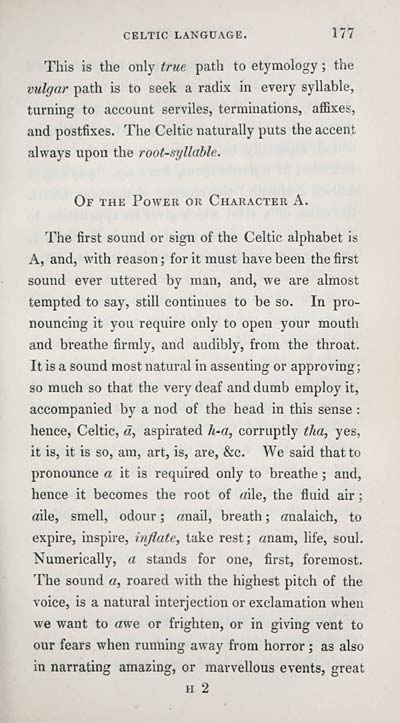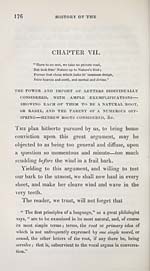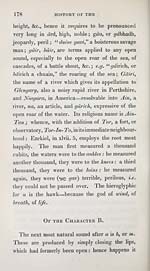Download files
Complete book:
Individual page:
Thumbnail gallery: Grid view | List view

CELTIC LANGUAGE. 177
Tliis is the only true path to etymology ; the
vulgar path is to seek a radix in every syllable,
turning to account serviles, terminations, affixes,
and postfixes. The Celtic naturally puts the accent
always upon the root-syllahle.
Of the Power or Character A.
The first sound or sign of the Celtic alphabet is
A, and, with reason ; for it must have been the first
sound ever uttered by man, and, we are almost
tempted to say, still continues to be so. In pro-
nouncing it you require only to open your mouth
and breathe firmly, and audibly, from the throat.
It is a sound most natural in assenting or approving;
so much so that the very deaf and dumb employ it,
accompanied by a nod of the head in this sense :
hence, Celtic, à, aspirated h-a, corruptly tha, yes,
it is, it is so, am, art, is, are, &c. We said that to
pronounce a it is required only to breathe ; and,
hence it becomes the root of «ile, the fluid air ;
aile, smell, odour ; anail, breath ; analaich, to
expire, inspire, injlate, take rest; anam, Hfe, soul.
Numerically, a stands for one, first, foremost.
The sound a, roared with the highest pitch of the
voice, is a natural interjection or exclamation when
we want to awe or frighten, or in giving vent to
our fears when running away from horror ; as also
in narrating amazing, or marvellous events, great
H 2
Tliis is the only true path to etymology ; the
vulgar path is to seek a radix in every syllable,
turning to account serviles, terminations, affixes,
and postfixes. The Celtic naturally puts the accent
always upon the root-syllahle.
Of the Power or Character A.
The first sound or sign of the Celtic alphabet is
A, and, with reason ; for it must have been the first
sound ever uttered by man, and, we are almost
tempted to say, still continues to be so. In pro-
nouncing it you require only to open your mouth
and breathe firmly, and audibly, from the throat.
It is a sound most natural in assenting or approving;
so much so that the very deaf and dumb employ it,
accompanied by a nod of the head in this sense :
hence, Celtic, à, aspirated h-a, corruptly tha, yes,
it is, it is so, am, art, is, are, &c. We said that to
pronounce a it is required only to breathe ; and,
hence it becomes the root of «ile, the fluid air ;
aile, smell, odour ; anail, breath ; analaich, to
expire, inspire, injlate, take rest; anam, Hfe, soul.
Numerically, a stands for one, first, foremost.
The sound a, roared with the highest pitch of the
voice, is a natural interjection or exclamation when
we want to awe or frighten, or in giving vent to
our fears when running away from horror ; as also
in narrating amazing, or marvellous events, great
H 2
Set display mode to: Large image | Transcription
Images and transcriptions on this page, including medium image downloads, may be used under the Creative Commons Attribution 4.0 International Licence unless otherwise stated. ![]()
| Early Gaelic Book Collections > Hew Morrison Collection > Adhamh agus Eubh, no Craobh Sheanachais nan Gàël > (307) |
|---|
| Permanent URL | https://digital.nls.uk/76900419 |
|---|
| Description | A selection of items from a collection of 320 volumes and 30 pamphlets of literary and religious works in Scottish Gaelic. From the personal library of Hew Morrison, the first City Librarian of Edinburgh. |
|---|
| Description | Selected items from five 'Special and Named Printed Collections'. Includes books in Gaelic and other Celtic languages, works about the Gaels, their languages, literature, culture and history. |
|---|

